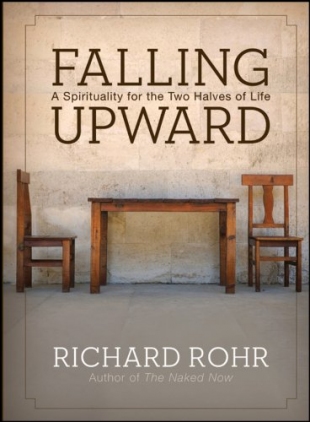Richard Rohr is a Franciscan priest and founder of the Center for Action and Contemplation. He is well-known for his many books and recorded teachings. He writes regularly for Radical Grace, his Center's publication, Sojourners and Tikkun. Rohr is profiled on Spirituality & Practice as a Living Spiritual Teacher. For more information on his work visit www.cacradicalgrace.org.
In this visionary work, Rohr writes about the duties of the first half of life and then charts the adventures of the second half of life where spiritual maturity is the goal. Or to put it another way, the first stage is to create a strong container for identity whereas the second stage is to fill that container with the content of our deepest and fullest self.
Early on our spiritual journey, we are called to establish our security, identity, boundaries, safety, and a minimum of order. The first half of life could be called "early stage religion" which prepares us for the inner experience of God to come. It also manifests itself with the adolescent energy of either/or categories and the tendency to rush towards judgment. The fallout from this brand of dualistic thinking is ever expanding circles of anger, hatred, and violence. Rohr believes that we need a ritual of closure from this stunted first-stage energy. In the men's work he has done, this is called "discharging your loyal soldier." Although it may feel like a loss of self, what is really going on is the death of the false self. Rohr calls this the quiet workings of grace:
"God has to undo our illusions secretly, as it were, when we are not watching and not in perfect control, say the mystics. That is perhaps why the best word for God is actually Mystery. We move forward in ways that we do not even understand and through the quiet workings of time and grace. When we get there, we are never sure just how it happened, and God does not seem to care who gets the credit, as long as our growth continues. As St. Gregory of Nyssa already said in the fourth century, 'Sin happens whenever we refuse to keep growing.' "
The movement into the second half of life begins with the acceptance of the tragic sense of life, dealing with necessary suffering, doing shadow work, leaving our comfort zone and venturing out into the unknown, living with a both/and perspective, being a generative person, seeing our life as more participative than assertive, living simply, and radiating joy. These elements of spiritual maturity don’t come without struggle, pain, doubt, sadness, loneliness, failure, and loss — and they don't happen overnight. That is why most wise people have lived a long life and proved equal to the challenges and the obstacles of the spiritual path. Rohr concludes:
"Most of us tend to think of the second half of life as largely about getting old, dealing with health issues and letting go of our physical life, but the whole thesis of this book is exactly the opposite. What looks like falling can largely be experienced as falling upward and onward into a broader and deeper world, where the soul has found its fullness, is finally connected to the whole, and lives inside the Big Picture."
